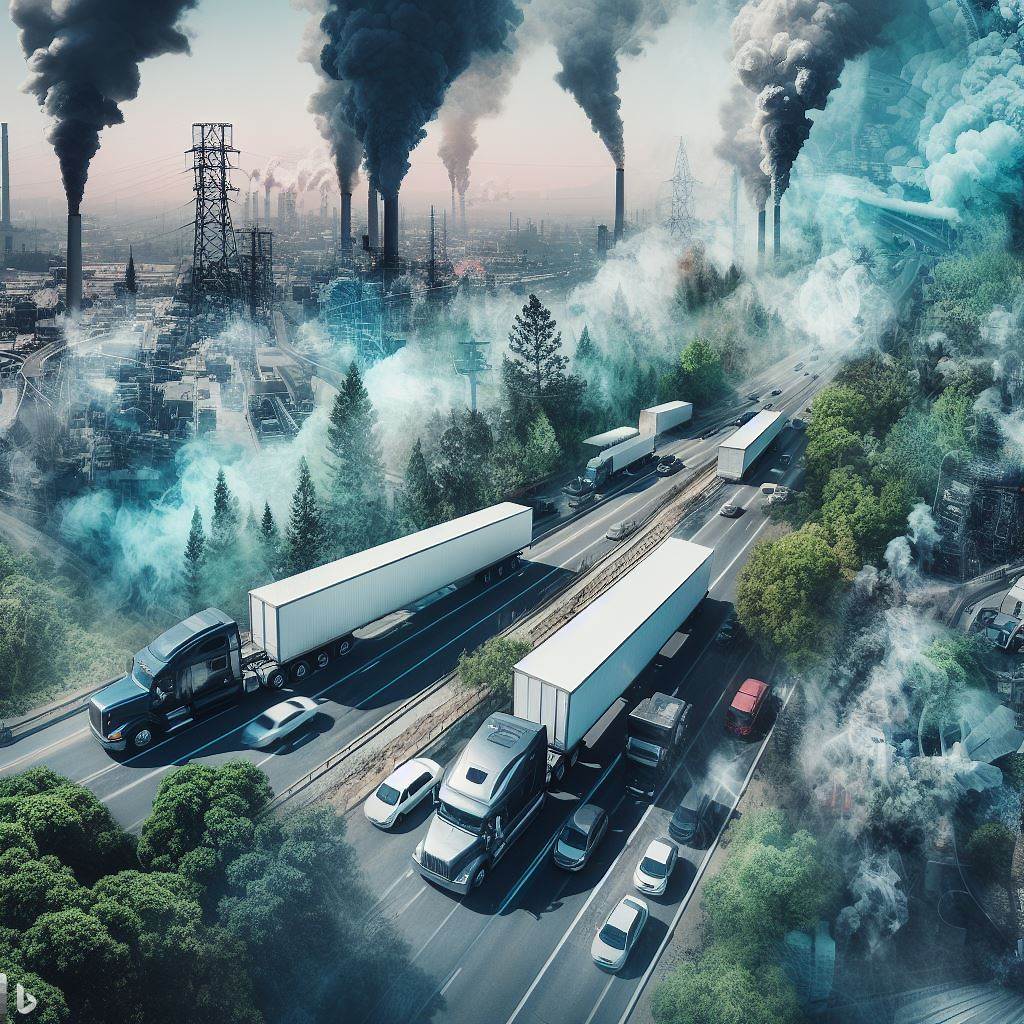Introduction
Trucking plays a vital role in the US economy, facilitating the movement of goods across the country.
However, it also has a significant environmental impact that needs to be addressed.
One of the major issues is air pollution. Diesel trucks emit large quantities of harmful pollutants, such as nitrogen oxides and particulate matter, which contribute to respiratory diseases and poor air quality.
This poses a serious health risk, especially in densely populated areas along trucking routes.
In addition to air pollution, trucking is a major contributor to greenhouse gas emissions.
The transportation sector is one of the largest sources of carbon dioxide emissions in the US.
The carbon footprint of trucking is attributed to the burning of fossil fuels, primarily diesel, for propulsion.
These emissions contribute to climate change, leading to adverse effects such as global warming and extreme weather patterns.
To address these environmental impacts, several solutions can be implemented.
First, promoting the use of alternative fuels such as biodiesel and electric power can significantly reduce emissions.
Additionally, improving the efficiency of trucking operations through better logistics and route planning can minimize fuel consumption.
Lastly, implementing stricter emission standards and regulations for trucks can ensure cleaner and greener transportation.
In essence, the environmental impact of trucking in the US is a pressing issue that requires attention.
By addressing air pollution, reducing greenhouse gas emissions, and adopting sustainable practices, we can minimize the negative impact of trucking on the environment and work towards a greener future.
Overview of Trucking Industry in the US
A. Statistics on the prevalence and growth of the trucking industry
- The trucking industry is a major sector in the US, with millions of trucks on the road.
- According to the American Trucking Associations (ATA), there are over 3.5 million truck drivers in the US.
- Trucking is responsible for transporting around 70% of freight in the US.
- The trucking industry generates hundreds of billions of dollars in revenue each year.
- From 2012 to 2019, the revenue of the trucking industry increased by more than $100 billion.
- The demand for trucking services is expected to continue growing due to e-commerce and consumer demand.
- There is a shortage of truck drivers in the US, which is impacting the industry’s growth.
- The trucking industry supports various sectors, including manufacturing, retail, and construction.
B. Role of trucking in the US economy
- Trucking plays a vital role in the US economy by facilitating the movement of goods across the country.
- It is an essential part of the supply chain, connecting producers, distributors, and consumers.
- Trucking enables businesses to reach markets nationwide, promoting economic growth and competitiveness.
- The industry provides employment opportunities to millions of people, supporting local communities.
C. Importance of understanding the environmental impact of trucking
- Trucking has a significant environmental impact, affecting air quality, climate change, and ecosystems.
- Trucks emit pollutants such as nitrogen oxides (NOx), particulate matter (PM), and greenhouse gases (GHGs).
- These emissions contribute to smog formation, respiratory diseases, and global warming.
- Understanding the environmental impact of trucking is crucial for developing sustainable transportation solutions.
- Regulatory agencies and policymakers can use this knowledge to implement effective measures for emissions reduction.
- Truck manufacturers can develop cleaner and more fuel-efficient vehicles to minimize environmental harm.
- Consumers and businesses can make informed decisions to support eco-friendly transportation options.
- Green initiatives, such as electrification and alternative fuels, can help reduce the environmental impact of trucking.
Overall, the trucking industry is a vital component of the US economy, but it also poses environmental challenges.
By understanding the prevalence, growth, role, and impact of trucking, we can work towards a sustainable and greener future for transportation in the US.
Read: Understanding the Different Truck Driver License Types
Environmental Issues Associated with Trucking
Trucking plays a crucial role in the movement of goods and materials across the United States.
However, this industry is not without its environmental drawbacks.
In this section, we will explore the environmental issues associated with trucking and their impacts on the ecosystem.
Transform Your Career Today
Unlock a personalized career strategy that drives real results. Get tailored advice and a roadmap designed just for you.
Start NowA. Air pollution from truck emissions
1. Types of pollutants emitted by truck
Trucks emit various pollutants into the air, contributing to air pollution.
These pollutants include nitrogen oxides, sulfur oxides, and particulate matter.
The release of these pollutants has detrimental effects on both human health and the environment.
The emissions from trucks have been linked to respiratory diseases, such as asthma, bronchitis, and lung cancer.
Fine particulate matter, released by diesel trucks, can penetrate deep into the lungs and cause significant respiratory problems.
These emissions also contribute to air quality degradation, smog formation, and acid rain.
2. Health and environmental impacts of air pollution
The health impacts of truck emissions are well-documented.
Studies have shown that people living near busy trucking routes are at higher risk of respiratory illnesses and cardiovascular problems.
The environmental impacts are equally concerning. Air pollution from truck emissions can harm ecosystems, damage crops, and reduce biodiversity.
B. Contribution to greenhouse gas emissions
1. Carbon dioxide emissions from trucks
Trucking is a major contributor to greenhouse gas emissions, particularly carbon dioxide (CO2).
The burning of fossil fuels, such as diesel, releases CO2 into the atmosphere. This, in turn, contributes to climate change and global warming.
The large number of trucks on the road, combined with their fuel consumption, makes them a significant source of CO2 emissions.
These emissions trap heat in the atmosphere, leading to rising temperatures, changing weather patterns, and sea-level rise.
2. Impact of truck emissions on climate change
The emissions from trucks have a notable impact on climate change.
As temperatures rise, it affects natural habitats, ecosystems, and wildlife.
More frequent and severe weather events, such as hurricanes and droughts, can also be attributed to increased greenhouse gas emissions.
It is crucial to address truck emissions to mitigate the effects of climate change and work towards a sustainable future.
C. Water and soil pollution
1. Water and soil pollution
Trucks can cause water and soil pollution through spills and leaks.
Accidental spills of hazardous materials from trucks can contaminate nearby water bodies, causing harm to aquatic life and the surrounding environment.
Showcase Your Business Today
Reach thousands of readers actively exploring professional services. Publish your business profile and grow your audience now.
Publish NowLeaks in truck fuel tanks or storage containers can also pollute soil and groundwater.
Furthermore, diesel fuel used by trucks contains contaminants such as benzene and sulfur, which can have long-term effects on the environment.
These chemicals can seep into the soil, affecting the quality of groundwater and potentially entering the food chain.
Contaminants in diesel fuel and their environmental effects
The contaminants present in diesel fuel have multiple environmental effects.
Benzene, a known carcinogen, can leach into the soil and pose a risk to nearby vegetation and organisms.
Sulfur, when released into the atmosphere during combustion, contributes to acid rain, which harms aquatic ecosystems and damages infrastructure.
Therefore, trucking has significant environmental impacts, particularly in the areas of air pollution, greenhouse gas emissions, and water/soil pollution.
Understanding and addressing these issues is vital for the sustainability and long-term well-being of both the trucking industry and the environment.
Read: Truck Driving Schools: Best Ones in the USA

Efforts to reduce the environmental impact of trucking
A. Government regulations and policies for truck emissions
Government regulations play a crucial role in mitigating the environmental impact of the trucking industry.
The United States has implemented various policies to control and reduce truck emissions.
These regulations aim to improve air quality and decrease greenhouse gas emissions.
1. Overview of federal regulations on truck emissions
The Environmental Protection Agency (EPA) and the National Highway Traffic Safety Administration (NHTSA) jointly regulate truck emissions.
The EPA sets emission standards for criteria pollutants such as nitrogen oxides (NOx), particulate matter (PM), and greenhouse gases (GHGs).
The NHTSA regulates fuel economy standards for heavy-duty vehicles to promote energy efficiency.
These regulations apply to different classes and types of trucks, including heavy-duty vehicles, medium-duty vehicles, and light-duty trucks.
They set specific emission limits that manufacturers must comply with when producing new trucks.
2. Recent developments in emission standards
In recent years, the EPA has introduced stricter emission standards to further reduce the environmental impact of trucking.
The “Clean Truck” standards, announced in 2016, aim to cut carbon pollution and improve fuel efficiency.
These standards set progressively tightening emission limits for heavy-duty vehicles, with the final phase taking effect in 2027.
B. Technological advancements in trucks
Technological advancements have also contributed to reducing the environmental impact of trucking.
The development of electric and hybrid trucks offers promising solutions for cleaner transportation.
1. Introduction of electric and hybrid trucks
Electric and hybrid trucks have gained traction in recent years as viable alternatives to traditional diesel-powered trucks.
These vehicles use electric motors for propulsion, significantly reducing or eliminating tailpipe emissions.
Electric trucks are powered by rechargeable batteries, while hybrid trucks combine electric motors with internal combustion engines.
2. Benefits and challenges of adopting new technologies
The adoption of electric and hybrid trucks brings several benefits, such as reduced greenhouse gas emissions, lower fuel costs, and quieter operation.
Electric trucks also have lower maintenance costs due to fewer mechanical parts. However, challenges remain, including limited range, charging infrastructure, and higher upfront costs.
Continued innovation and infrastructure development are necessary for widespread adoption.
C. Sustainable practices in logistics and transportation
Aside from regulations and technological advancements, sustainable practices in logistics and transportation can further reduce the environmental impact of trucking.
1. Fuel-efficient route planning and optimization
Efficient route planning can minimize fuel consumption and emissions.
The use of technology and advanced algorithms to optimize routes helps reduce miles traveled, fuel usage, and overall environmental impact.
Real-time traffic data and predictive analytics also aid in selecting the most efficient routes based on current conditions.
2. Adoption of alternative fuels and renewable energy sources
Trucking companies can shift to alternative fuels such as natural gas, biodiesel, or hydrogen.
These fuels produce fewer emissions compared to conventional diesel.
Additionally, the use of renewable energy sources, such as solar or wind power, to charge electric trucks can further reduce carbon footprints in the transportation sector.
Efforts to reduce the environmental impact of trucking require a multi-faceted approach.
Government regulations, technological advancements, and sustainable practices in logistics and transportation are all essential components towards achieving a greener and more sustainable trucking industry.
Read: Essential Safety Tips Every Truck Driver Should Know
Examples of Companies Leading the Way in Sustainable Trucking
A. Case Studies of Trucking Companies with Environmentally-Friendly Initiatives
1. Implementation of Eco-Friendly Technologies
Several trucking companies are revolutionizing the industry by embracing cutting-edge, eco-friendly technologies.
Companies like UPS and FedEx have introduced electric and hybrid delivery vehicles, reducing their carbon footprint.
Showcase Your Business Today
Reach thousands of readers actively exploring professional services. Publish your business profile and grow your audience now.
Publish NowVolvo Trucks, a pioneer in sustainable transportation, has launched trucks powered by liquefied natural gas (LNG).
This innovative approach not only minimizes greenhouse gas emissions but also provides a tangible example of adopting alternative fuels in heavy-duty transport.
Knight-Swift Transportation has invested in aerodynamic trailer solutions, significantly improving fuel efficiency.
These investments showcase a commitment to reducing environmental impact while maintaining operational efficiency.
2. Partnerships with Environmental Organizations
Collaborating with environmental organizations has become a key strategy for companies committed to sustainable trucking.
An exemplary case is Walmart, which partnered with the Environmental Defense Fund to develop and implement sustainable freight transportation initiatives.
J.B. Hunt, another industry leader, joined forces with the Sustainability Consortium to enhance supply chain sustainability.
These partnerships emphasize the importance of collective action in fostering environmentally responsible practices within the trucking sector.
B. Positive Impacts of Sustainable Trucking Practices on the Bottom Line
1. Cost Savings from Reduced Fuel Consumption
Sustainable trucking practices not only benefit the environment but also contribute to significant cost savings.
Companies utilizing fuel-efficient technologies, like Covenant Transport, experience reduced fuel consumption and lower operational costs.
Old Dominion Freight Line’s commitment to fuel efficiency includes implementing route optimization systems, resulting in decreased fuel consumption and transportation expenses.
These cost-saving measures demonstrate the financial advantages of embracing environmentally-friendly initiatives.
2. Enhanced Brand Reputation and Customer Loyalty
Adopting sustainable practices positively influences a company’s brand reputation.
Consumers are increasingly environmentally conscious, and trucking companies aligning with this mindset, such as Schneider National, enjoy enhanced brand perception.
FedEx’s EarthSmart program, emphasizing sustainable operations, has not only bolstered its reputation but also fostered customer loyalty.
By prioritizing sustainability, trucking companies can attract and retain customers who prioritize eco-friendly choices in their supply chain partnerships.
In summary, these case studies illustrate how trucking companies can lead the way in sustainable practices, implementing technologies and forming partnerships that benefit both the environment and the bottom line.
Read: Pros and Cons: Life as a Long-Haul Truck Driver
Conclusion
The environmental consequences of trucking cannot be ignored.
The blog post shed light on the significant fuel consumption and emissions associated with this industry.
Additionally, deforestation resulting from the construction and expansion of road networks was highlighted as another pressing concern.
To tackle these challenges, it is essential for individuals and businesses to support sustainable trucking practices.
This can be accomplished by leveraging alternative fuels like electric or hydrogen-powered trucks, investing in research and development for more efficient engines, and advocating for policies that promote green logistics.
By adopting sustainable practices, we can reduce fuel consumption, minimize emissions, and preserve our natural resources.
This not only benefits the environment but also contributes to a healthier society and a more resilient economy.
Addressing the environmental impact of trucking is vital. It requires collective action from all stakeholders.
As individuals, we can make conscious choices by supporting companies that prioritize sustainability.
As businesses, we can integrate green practices into our operations and actively seek out sustainable transportation options.
Let us work together to create a future where the impact of trucking on the environment is minimized, ensuring a more sustainable planet for generations to come.
[E-Books for Sale]
The Big Book of 500 High-Paying Jobs in America: Unlock Your Earning Potential
$19.99 • 500 High-Paying Jobs • 330 pages
Explore 500 high-paying jobs in America and learn how to boost your career, earn more, and achieve success!
See All 500 High-Paying Jobs of this E-Book
1001 Professions Without a Degree: High-Paying American Jobs You Can Start Now
$19.99 • 1001 Professions Without a Degree • 174 pages
Discover 1001 high-paying jobs without a degree! Unlock career tips, skills, and success strategies for just $19.99!




